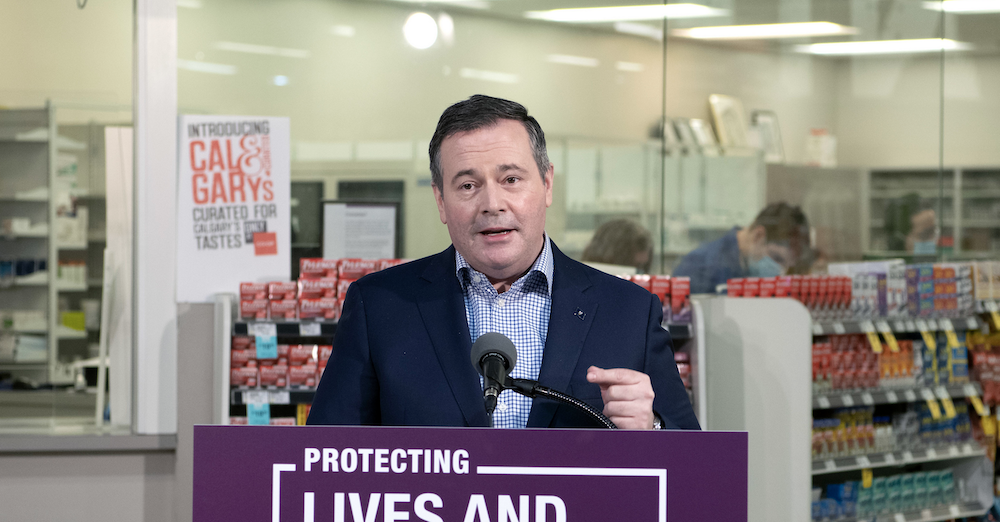O Budget, where is thy fiscal sting? O Premier, where is thy fiscal victory?
From 2016, when he first cast his eyes on Alberta provincial politics, until a few weeks ago when his polls slipped into the basement, the words “fiscal discipline” and “fiscal reckoning” were often on Premier Jason Kenney’s lips.
The first was going to be imposed by Kenney’s government on Alberta; the second was to be the result of that imposition.
It wasn’t going to be pleasant, but like bad-tasting medicine, Kenney crowed to his supporters, it was going to be good for us.
Yesterday, Kenney stood up in front of a display of headache tablets in a Calgary grocery store’s pharmacy aisle and tried to change the tune without actually changing the song.
That is to say, he was trying again to change the narrative about what’s eventually coming, without actually changing too many of the details. As noted in the coverage of last Thursday’s provincial budget, though, the global coronavirus pandemic and parallel economic downturn have played merry hell with Kenney’s planned schedule for imposing harsh discipline on Alberta.
There seemed to be very little actual news at the premier’s news conference beyond the effort to rebrand the UCP plan for stinging fiscal discipline as a historic investment in health care.
With Finance Minister Travis Toews and Health Minister Tyler Shandro supporting him, the premier earnestly assured Albertans he has no plans to bring a fiscal reckoning down on the health-care system — just yet, anyway.
Naturally, he engaged in a bit of ritual Ottawa bashing, blaming the Trudeau government for Alberta’s vaccine delivery problems — a story that grows less persuasive as vaccine doses flow into the province faster than the province can get them into arms.
Kenney’s only concession to the fiscal reckoning of old crept into his response to a sympathetic reporter’s question about implementing a sales tax. “The next big challenge in front of us,” he said, will be “coping with COVID, the pandemic and recession, and while at the same time operating more efficiently.
“And here’s the bottom line,” he went on. “We get to 2023, around the time of the next provincial election, we currently expect to have a deficit in the range of $8 billion and by that point … to have found savings through some really tough decisions that will bring us to the average spending amongst major Canadian provinces.”
Between the lines, this sounds very much as if the government has given up on its plan to cut programs for now, but to achieve as much of the same savings as possible through layoffs and wage rollbacks in the public sector.
That, of course, is a formula for labour strife, which the UCP may well think it can win, and use to defeat the NDP challenge to boot.
But that’s for later. Right now the prescription calls for a course of soothing anodynes to calm jittery Albertans, both those hunkered down anxiously awaiting a COVID-19 vaccine and those angry at any restrictions.
To that end, Alberta Health Services CEO Verna Yiu was also at the news conference, assuring anyone listening that “the government of Alberta has been our partner and supporter through all of this, ensuring that our health-care system had the additional support it needed.”
As for the tieless trio from cabinet, their symbolic lack of neckwear was presumably meant to make the point they’re getting down to business about lives and livelihoods, as the UCP’s ubiquitous new plum-coloured signs proclaim.
And good for Kenney that he can get his cabinet ministers to behave themselves. Even Toews had a smile on his face, belying the rumours he and the premier had some tense conversations behind closed doors about the speed and severity of the fiscal reckoning.
As for the premier’s caucus, though, things don’t seem as amiable.
At least five UCP MLAs yesterday published nearly identical social media posts complaining that their constituents’ pleas for a Texas-style total pandemic reopening are falling on deaf ears and the premier doesn’t even tell them about his plans.
“As an MLA, I learned about yesterday’s announcement the same time and way as most Albertans did,” complained Todd Loewen, Central Peace-Notley, Drew Barnes, Cypress-Medicine Hat, Angela Pitt, Airdrie, Ron Orr, Lacombe-Ponoka, and Michaela Glasgo, Brooks-Medicine Hat. The post seems to have originated with Loewen.
The rebels’ tone was defiant, and even mildly threatening. “I will take the concerns of my constituents back to my government colleagues in hopes it will make a difference,” they all concluded.
And if it doesn’t?
They didn’t provide an answer.
Uh-oh! Cancel culture comes to coal!
Every planned coal project on Earth should be cancelled to end humanity’s “deadly addiction” to the most polluting fossil fuel, United Nations Secretary General António Guterres said yesterday.
Thereafter, thermal and coking coal should be phased out in the West by 2030 and everywhere else by 2040, Guterres told the Powering Past Coal Alliance conference.
In addition to cancelling all global coal projects now “in the pipeline,” the secretary general urged an end to international financing of coal plants and a global effort to provide a just transition for coal-industry workers everywhere.
So, yes, that would include open-pit ethical metallurgical coal mining in the Rockies, in case you were wondering.
Alberta Energy Minister Sonya Savage might want to keep that in mind when she does her planned review of Alberta coal policy, whenever.
David Climenhaga, author of the Alberta Diary blog, is a journalist, author, journalism teacher, poet and trade union communicator who has worked in senior writing and editing positions at The Globe and Mail and the Calgary Herald.
Image credit: Alberta Newsroom/Flickr — Photography by Chris Schwarz/Government of Alberta




